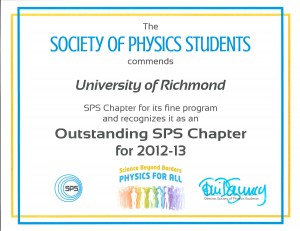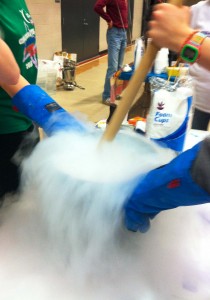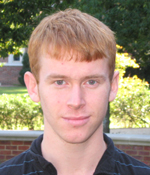At the University of Richmond physics department, we have long believed that in addition to the outstanding teaching and opportunities for undergraduate research, one of our major strengths is the sense of community and dedication to each other that our students have as part of the departmental culture. This was recently demonstrated when our department’s chapter of the Society of Physics Students (SPS) was selected as an “outstanding” chapter by the national SPS.
The “outstanding” designation is a notable accomplishment – less than 10% of the SPS chapters are so honored, an overall average of around one per state. As stated in the award letter
“The selection as an outstanding SPS chapter is based on an assessment of the depth and breadth of SPS activities conducted by your chapter presnted in your report in areas such as physics research, public science outreach, physics tutoring programs, hosting and representation at physics meetings, providing social interaction for chapter members, and participation in SPS regional and national level programs.”

The research, social, and outreach activities of the chapter were discussed in a report to the national SPS prepared by chapter President Alexis Achey, along with Vice President Molly Luginbohl, Treasurer JP Wheeler, Secretary Kristen Gell, and Historian Liz Bisaha. Among the research activities noted were five students who received fellowships to travel to present their research at the Division of Nuclear Physics fall meeting, and two students who traveled to Paris to work with collaborators over the summer. Social highlights included a stargazing night, liquid nitrogen ice cream party, movie nights, a “deconstruction night” where old equipment was disassembled, recruitment posters, and custom T-shirts. The outreach activities were centered around physics students’ pivotal role in the Richmond Physics Olympics, a competition for high school students.

This year is not the first time Richmond SPS has been so-honored, having previously received the outstanding chapter award in the 20056-2006 and 2006-2007 school years.


 had his Department of Energy grant renewed for a further three years. This award, funded by the National Nuclear Security Administration funds Dr. Beausang’s non-classified research into nuclear stewardship science. In addition to providing travel and equipment funding the award provides salary support for a postdoctoral fellow and graduate student as well as summer stipends for Richmond undergraduates to enable them to participate in experiments and study nuclear physics under Dr. Beausang’s guidance.
had his Department of Energy grant renewed for a further three years. This award, funded by the National Nuclear Security Administration funds Dr. Beausang’s non-classified research into nuclear stewardship science. In addition to providing travel and equipment funding the award provides salary support for a postdoctoral fellow and graduate student as well as summer stipends for Richmond undergraduates to enable them to participate in experiments and study nuclear physics under Dr. Beausang’s guidance.

